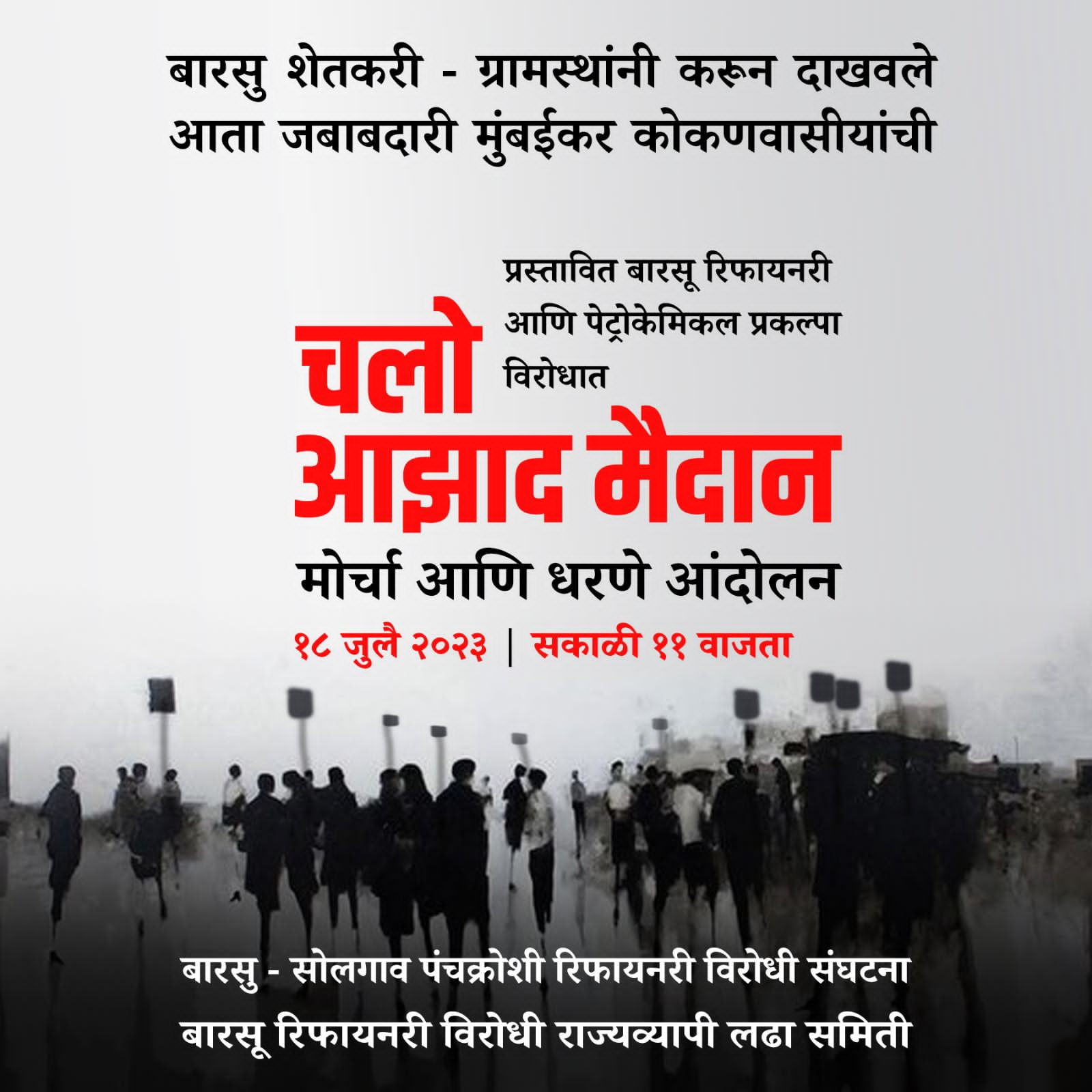On July 18, a protest was organised at Azad Maidan, Mumbai, on behalf of the people of Barsu-Solgaon Panchkroshi, where demands for the permanent deportation of the proposed refinery project in Barsu were raised. The said protest was jointly organised by Barsu-Solgaon Panchkroshi Refinery Anti Sangharsh Samiti and Barsu Refinery Anti Statewide Ladha Samiti. At the protest, a broad coalition of progressive parties and organisations in Maharashtra had joined the movement and showed support. Leaders like Satyajit Chavan, Prakash Reddy, Nitin Jathar, Deepak Joshi etc. were reported to have participated in the said movement.
The following was said regarding the aim behind organising the protest:
“Konkan is known for its vast bio-diversity forests, rock carvings, coconut and mango groves, clean and beautiful beaches; but recently, a situation has arisen as to whether the vast beaches and natural resources here are rising at the root of Konkan. Many destructive projects are being launched in the name of Konkan in the name of development. Raigad area, which is part of Konkan, has always been engulfed by polluting projects. Many projects in Ratnagiri and Sindhudurg districts are being imposed on the public in the name of employment. By setting up a refinery project in the Barsu-Solgaon area, the nature, agriculture, fishing, coconut-palm, mango-banana gardens are going to be destroyed. Now is the time to fight.”
At the protest, alternatives were also be presented to force the state government to adopt an alternative development policy that creates environmentally balanced employment based on natural resources in Konkan.
Background of the refinery
The Ratnagiri Refinery and Petrochemical Project, proposed in 2014 by the Modi government and the Maharashtra BJP-Shiv Sena government, has been endorsed as Asia’s largest oil refinery. It was supposed to be a joint venture between three Indian PSUs – Indian Oil, HPCL, and BPCL – and Saudi Arabia’s Aramco and the National Oil Company of the United Arab Emirates.
The project was proposed to be located in Nanar over a 200-square-kilometer area. While land-grabbers, speculators, and BJP leaders eager to expand the party’s presence in the Konkan region embraced the project concept, locals and activists led protests against the proposed project, citing concerns that the Konkan area has already been overloaded and overcrowded with several major plants, which has already resulted in the environment taking a heavy toll.
It is important to note that, since the Tarapur nuclear power plant was built in 1969, a slew of projects have sprung up along the coast, polluting the air and discharging hazardous effluents into the creeks without treatment. Locals and activists have highlighted time and again that all of these projects have wreaked havoc on the environment, resulting in massive water and air pollution, the destruction of local livelihood chains, and massive displacement and dispossession of people. As a result, each project has been the subject of lengthy protests since its inception, with an increasing number of people feeling the adverse effects.
It is also worth noting that previously, in the face of growing public opposition, the Shiv Sena had insisted on the project’s cancellation, and the BJP had been forced to accept the demands of the Shiv Sena and cancel the project. However, with the BJP regaining power by splitting the Shiv Sena, the Shinde-Fadnavis government had announced its intention to restart the project. Previously, the Uddhav Thackeray government proposed downsizing the project and relocating it north of the old site, adjacent to the Jaitapur project, in the Barsu-Solgaon-Devache Ghotane area. Despite the outrage and criticism, the Shinde government had revived the original project idea last year.
In November 2022, the government sent armed police personnel of the Rapid Action Force (RAF) and the Riot Control Police to carry out a route march in Rajapur and the surrounding villages where the refinery is planned. Along with Rajapur police, 60 RAF personnel and 29 Riot Control personnel were part of this march.
In February of 2023, shockwaves were sent through the country when journalist Shashikant Warishe was killed after being run down and crushed by a vehicle purportedly driven by Pandharinath Amberkar, a local land-dealer and accused in multiple land grab cases in the disputed Barsu refinery in Maharashtra’s western Konkan district. Warishe had been covering issues relating to the establishment of Ratnagiri Refinery & Petrochemicals Ltd (RRPCL) near Barsu, which has been met with opposition from some locals.
A few months ago, in April 2023, local protests had flared up against the proposed refinery project and the surveys scheduled for soil testing in Ratnagiri’s Barsu village, pursuant to which Section 144 of CrPC was imposed and protestors were detained. Local activists and journalists, involved in supporting the village against the proposed location of the Ratnagiri Refinery Petrochemicals Ltd., were detained too.
Related:
Maharashtra Govt compelled to withdraw 144 orders against residents & protesters: Barsu Refinery
#NoToBarsuRefinery: Protestors manhandled and arrested, activist re-arrested after attaining bail
Journalist Shashikant Warishe murdered for uncovering anomalies in the Barsu Refinery project

